Representation.
Trademark Counterfeiting
The crime of New York trademark counterfeiting punishes people who sell counterfeit goods that use a fake trademark. Trademarks are marks used by companies to distinguish their products from other brands. Examples include the Nike swoosh, the Harley-Davidson bar and shield, and the Louis Vuitton LV. Punishments for trademark counterfeiting range from a class A misdemeanor to a class C felony.
Call our aggressive and experienced New York criminal defense attorneys if you or someone you know is facing trademark counterfeiting charges. Call us today for a free consultation. Mr. Tile, the founder of our firm was a former prosecutor who prosecuted trademark counterfeiting cases for the government and now represents individuals arrested for Trademark Counterfeit crimes in New York.
A class A misdemeanor carries a maximum penalty of one year in prison and a fine of 1,000.00 or double the gain from committing the crime. A class C felony has a maximum penalty of fifteen years in prison and a fine of $5000.00 or double the gain from committing the crime. Trademark counterfeiting is a common charge, so common that courts have taken note of the fact that trademark counterfeiting is one of the most common misdemeanor crimes charged in New York City.
The elements of trademark counterfeiting are as follows:
- With deceptive or fraudulent intent or with intent to not follow laws controlling the sale of goods
- A person distributes, sells, or manufactures goods which have a counterfeit trademark
- Or a person possesses a counterfeit trademark and knows that the purpose of the counterfeit trademark is to attach it to goods.
When the retail value of the counterfeit goods sold exceeds $1000.00 the crime is elevated from a class A misdemeanor to a class E felony. When the value of the goods exceeds $100,000.00 the crime is elevated to a class C felony.
Charging instruments for trademark counterfeiting cases must be discreet and highly specific, which leaves them vulnerable to attack by the observant and aggressive New York criminal defense attorneys at Tilem & Associates. Many trademark counterfeiting cases have been dismissed based upon insufficient charging instruments. In New York, criminal charging instruments must contain the following:
- An accusatory part. The accusatory part must explain the crimes charged, and each element that must be proven to establish the crimes.
- A factual part. The factual part must explain the facts supporting the criminal charges. The basis of the facts must be the complainant’s personal knowledge or information and belief. The factual part must include non-hearsay evidence. Supposing the evidence would prove each element of the crimes alleged.
If a criminal charging instrument does not allege that the basis of the facts is first-hand knowledge or something other than hearsay, that instrument is not sufficient and must be dismissed. Imprecise work by the police or prosecution can leave the gate open to dismissal based on the inclusion of hearsay evidence in charging instruments. When police rely on other officers for verification of the trademarks or verification of the trademark comes from unnamed officials from the company whose trademark was copied dismissal is appropriate.
Under criminal law, the People can only prosecute the infringement of registered trademarks. Although it may not be intuitive, all trademark infringement is not criminal. Reproducing unregistered trademarks may be prohibited under unfair competition law, but unfair competition law is civil and would not subject the reproducer to possible prison time. Therefore, without allegations of copying a registered trademark, charges must be dismissed.
Accusatory instruments in trademark counterfeiting actions must distinguish the counterfeit trademark from the real one. Adequate allegations of trademark counterfeiting charges require more than merely naming the corporate owner of the reproduced trademark. The charging instrument must allege that the counterfeit trademarks were actually attached to the goods and that those counterfeit trademarks were substantially similar to the real trademarks.
Each of the three defenses above, that attack trademark infringement charging instruments are highly fact-specific and require detailed knowledge of criminal procedure and evidence law.
The skilled and experienced New York criminal defense lawyers at Tilem & Associates will thoroughly examine your charging documents and raise all defenses to the accusations against you. Call us today for a free case analysis either over the phone or in-person.

















